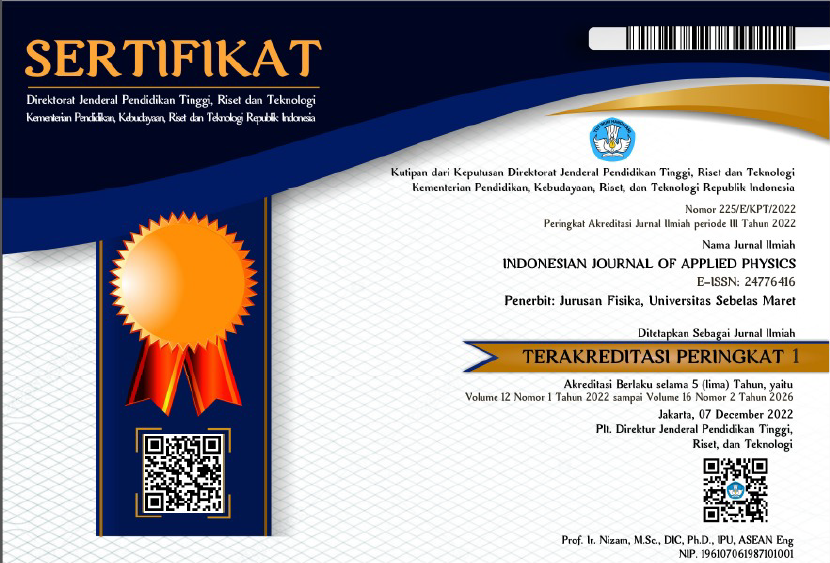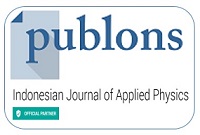Pengaruh Waktu terhadap Efisiensi Dye-Sensitized Solar Cell (DSSC)
Abstract
Penelitian ini mengkaji pengaruh waktu terhadap effisiensi Dye Sensitized Solar Cell (DSSC). Jarak elektroda divariasi sebesar 76 µm dan 114 µm. Karakterisasi sifat listrik menggunakan Keithley I-V meter yang dilakukan selama 21 hari dengan selang 7 hari untuk mengetahui kestabilannya. Karakterisasi I-V dengan selang waktu pengukuran menunjukkan bahwa DSSC dengan jarak elektroda 76 µm stabil hingga hari ke-7 dengan efisiensi 0,0347%. Pada jarak 114 µm stabil hingga hari ke-14 dengan efisiensi 0,0117%.
Keywords
Full Text:
PDFReferences
Sentil, R.A., Theerthagiri, J., Madhavan, J., Ganesan, S., & Arof, A.K. 2017. Influence of organic additive to PVDF-HFP mixed iodide electrolytes on the photovoltaic performance of dye-sensitized solar cells. Journal of Physics and Chemistry of Solids, 101, 18-24
Kagaku & Sumitomo. 2010. Development of Next Generation Organic Solar Cell. Japan: Sumitomo Chemical Co, Ltd.
Wang, Y.C., & Cho, C.P. 2017. Application of TiO-graphene nanocomposites to photoanode of dye-sensitized solar cell. Journal of Photochemistry and Photobiology A: Chemistry, 332, 1-9
Li, K., Wang, Y., Sun, Y., & Yuan, C. 2010. Preparation of nanocrystalline TiO2 electrode by layer-by-layer screen printing and its application in dye-sensitized solar cell. Materials Science and Engineering B, 175 (1), 44-47
Wu, C., Chen, B., Zheng, X., & Priya, S. 2016. Scaling of the flexible dye sensitized solar cell module. Solar Energy Materials & Solar Cells, 157, 438-446
Ertenela, S., Ocakoglu, K., Tarnowska A., Vakuliuk, A., & Gryko, D.T. 2015. Performance of zinc chlorophyll based molecules for dye sensitized solar cell. Dyes and Pigments, 114, 129-137
Jalali, M., Moakhar, R.S., Kushwaha, A., Goh, G.K.L., Riahinoori, N., & Sadrnezhaad, S.K. 2015. Enhanced dye loading-light harvesting TiO2 photoanode with screen printed nanorod-nanoparticles assembly for highly efficient solar cell. Electrochimica Acta, 169, 295-401
Wu, J., Lan, Z., Hao, S., Li, P., Lin, J., Huang, M., Fang, L., & Huang, Y. 2008. Progress on the electrolytes for dye-sensitized solar cells. Pure and Applied Chemistry, 80, 2241-2258
Bahramian, A., & Vashaee, D. 2015. In-situ fabricated transparent conducting nanofiber shape polyaniline/coral-like TiO2 thin film: Application in bifacial dye-sensitized solar cells. Solar Energy Materials & Solar Cells, 143, 284-295
Chen, L., Tan, W., Zhang, J., Zhou, X., Zhang, X., & Lin, Y. 2010. Fabrication of high performance Pt counter electrodes on conductive plastic substrate for flexible dye-sensitized solar cells. Electrochimica Acta, 55, 3721-3726.
Alwani, M.A., Mohamad, A.B., Ludin, N.A., Kadhum, A.A., & Sopian, K. 2016. Dye sensitised solar cells: Development, structure, operation principles, electron kinetics, characterisation, synthesis materials and natural photosensitisers. Renewable and Sustainable Energy Reviews, 65, 183-215
Pratiwi, D., Nurosyid, F., Supriyanto, A., & Suryana, R. 2016. Optical properties of natural dyes on the dye-sensitized solar cells (DSSC) performance. Journal of Physics: Conference Series, 776 (1).
Mahalingam, S., & Abdullah, H. 2016. Electron transport study of indium oxide as photoanode in DSSCs: A review. Renewable and Sustainable Energy, 63, 245-255
Hardani., H., Darmawan, M.I., & Supriyanto, A. 2016. Pengaruh Konsentrasi Ruthenium (N719) sebagai Fotosensitizer dalam Dye-Sensitized Solar Cells (DSSC) Transparan. Jurnal Fisika dan Aplikasinya, 12 (3), 104-108
Refbacks
- There are currently no refbacks.
















